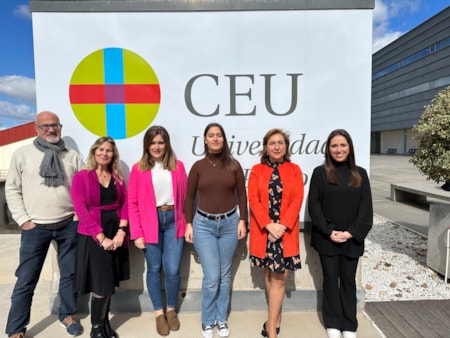
The research group 'Nutrigenomics and fetal programming-NUTRIPRO', led by the professor of Biochemistry and Molecular Biology at the School of Pharmacy, Carlos Bocos, has just published an article in the journal Nutrients demonstrating that the offspring of mothers who consumed fructose during gestation also present anomalous gestation, with alterations at the placental level that could contribute to the development of preeclampsia, compared to the control group.
The consumption of fructose, a sweetener used in the food industry either in the form of sucrose or corn syrup, has experienced a rapid increase in recent decades. Due to its higher sweetening power and lower glycemic index than glucose, fructose has been proposed as an alternative for diabetic patients. "Numerous studies, including those from our group, have shown that the consumption of this sugar is associated with a higher risk of obesity, cardiovascular diseases, metabolic syndrome, decreased insulin sensitivity, hypertriglyceridemia, and an increase in oxidative stress production. However, the consumption of fructose-rich beverages is not contraindicated during pregnancy," explains Dr. Bocos.
"Bearing in mind the limitations when extrapolating these results found in experimental animals to humans, the data from this study could explain the appearance in healthy pregnant women of alterations in plasma levels of proteins at risk in the development of preeclampsia, and that these alterations would be a consequence of a high consumption of fructose by their mothers during gestation," indicates Bocos.
During pregnancy, the placenta undergoes changes in vascularization that promote and regulate the circulation of blood between the mother and the fetus. In this process of vasculogenesis and angiogenesis activation, the balance between pro- and anti-angiogenic factors is fundamental. Preeclampsia is a complication that can occur during pregnancy, characterized by, among other symptoms, hypertension, and is one of the leading causes of maternal and fetal mortality. This, together with the scarcity of effective treatments, highlights the key role of research in elucidating the mechanisms involved in its pathogenesis and the risk factors that favor the appearance of this disease, as well as studying possible therapeutic targets for its treatment.
"The present study demonstrates that fructose consumption during gestation alters placental production of H2S, a gasotransmitter with anti-inflammatory and vasodilatory properties and, therefore, considered a protective agent. Furthermore, the production and levels of proteins related to the development of preeclampsia, in both the placenta and plasma respectively, were also found to be affected," explains Professor Carlos Bocos. Thus, maternal fructose consumption during gestation was sufficient to promote in offspring, at the placental level, the synthesis and release of several factors that would contribute to worsening the vascularization process that ensures a correct gestation.
It is worth noting that these results demonstrate the relevance of studying placental H2S production to fully understand the involvement of this gasotransmitter in the physiological and/or pathological evolution of gestation. Likewise, the alterations observed in these pregnant women reinforce the need to include in clinical practice a recommendation to reduce fructose consumption during pregnancy, mainly in sweetened beverages and processed foods, thus avoiding a possible risk factor in the development of preeclampsia. In this way, as is already the case with cans of energy drinks, this study advocates the inclusion of a warning on cans of sugar-sweetened soft drinks and fruit juices discouraging their consumption during pregnancy.
Professor Carlos Bocos leads the NUTRIPRO research group at CEU San Pablo University, composed of professors and researchers Paola Otero, María Isabel Panadero, Elena Fauste, and two doctoral students, Madelín Pérez-Armas and Cristina Donis.
More information:
Pérez-Armas, M.; Fauste, E.; Donis, C.; Rodrigo, S.; Rodríguez, L.; Álvarez-Millán, J.J.; Panadero, M.I.; Otero, P.; Bocos, C. Fructose Consumption Affects Placental Production of H2S: Impact on Preeclampsia-Related Parameters. Nutrients 2024, 16, 309. https://doi.org/10.3390/nu16020309